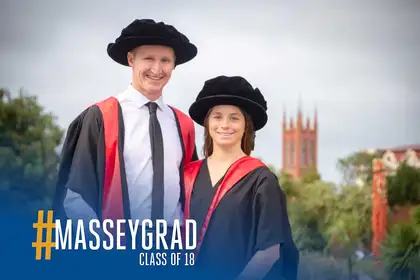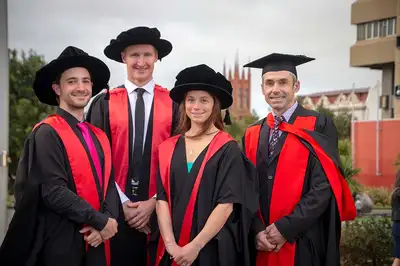
Emma and Will O’Connor on graduation day.
Studying and competing in endurance sport brought Emma and Will O’Connor together, so it seems fitting that they accepted their doctoral degrees one after the other as part of Massey graduation celebrations in Manawatū yesterday.
While the pair navigated the rigours of studying for a PhD, they never let it affect their own pursuits in endurance sports and describe themselves as “active relaxers”.
Originally from Auckland, Emma is a former professional cyclist who competed in the world road championships in 2010 and 2012 and rode professionally for a number of teams in Europe including in Spain, the Netherlands and France, before returning home to New Zealand to pursue further study.
While Will, who is originally from Hawkes Bay, is a competitive multisporter and innovator of the ‘run-walk method’. A technique of running a marathon competitively with bouts of walking and running. He has put this to the test, finishing the Hawkes Bay Marathon in second place with a time of 2 hours 45 minutes 52 seconds.

Fellow PhD graduate and flatmate Matt Miller with Will, Emma and supervisor Professor Steve Stanndard.
Study life
You would think they met at an endurance event in some far away country, but instead they met in an office in Palmerston North where they were both studying the science behind endurance. Their supervisor Professor Steve Stannard, an active relaxer and competitive athlete himself, had put the pair in the same office, however both agree that matchmaking would not have been on his mind.
“When I met Steve it was at a duathlon in Christchurch,” Will says. “And I remember thinking to myself, who is this old dude lining up with us, and of course he beat me and we got to talking about study and eventually things lined up to come to Massey.”
Both Emma and Will’s research topics looked at different ways of gaining an edge in sport. Emma looked into two dietary antioxidants (keratin and pomegranate extract) and their potential to enhance the efficiency of oxygen transport and uptake during endurance exercise, and subsequently improve performance of endurance cyclists.
The pomegranate extract study involved testing athletes who had ingested the extract 2.5 hours prior to intense cycling in Massey’s mobile sports laboratory in the carpark of the Turoa ski field. “We wanted to investigate how the supplement would work in a high-altitude environment, so that was the best place,” Emma says.
Her results showed that the pomegranate extract decreased some of the disadvantages associated oxygen uptake at high-altitude and that the keratin was able to increase lean muscle mass in the athletes.
“There’s still a lot of research that could be explored on this topic and could even be used for strength-based athletes. A lot of research is done into these kinds of supplements because athletes are trying to get an edge in a way that’s not illegal or dangerous.”
While Will investigated whether it was possible to “force adaptation” in a group of ultra-endurance athletes (those that participate in sporting events lasting four hours or more). Will tested different diets on athletes to see what their bodies were using as an energy source and if that energy source could be switched.
“Basically if you are running your body on carbs in endurance performance you are going to run out. These athletes try and find more ways to store more, but if you could use fat instead you would pretty much have an unlimited supply.”
He found when athletes had been eating a low carbohydrate, high fat, diet they were burning more fat during exercise. But the most extraordinary element of his research was that high-trained athletes’ are able to be efficient enough regardless of which diet they were on.
Although both say their interest were in competitive athletes, their findings are useful for the average person as well.
Emma says that juggling a relationship, a PhD and endurance sport was “relatively easy” with sport and academia going well together. She says there was a good group of sport scientists studying and that they would all feed into each other’s experiments as finding elite athletes to try out their ideas isn’t always easy.
“You go through a million stages in a PhD where you get all excited at the start and go hard until you burn-out. Think you have all the time in the world in the middle, then freak out as you write the book at the end, but we made it,” Will says.
Sporting pursuits and beyond
The pair have ticked off some amazing feats during their study - Emma having swapped her bike for running shoes and completing the 102 km Tarawera Ultramarathon in February.
“I never got injured in cycling, but it’s a new challenge and there are some benefits like not having to go too fast and you can go at your own pace as it’s a huge distance,” says Emma.
While Will worked on his run-walk method. “It was kind of a welcome distraction from the rigours of scientific proof where you get bogged down by the nitty gritty of every detail - where you can’t say this or that without heaps of detail, or choosing one method over another. I thought there could be another way to approach a marathon and it couldn’t have gone better,” he says.
“At first it was hard to go against what 100 per cent of what the other competitors were doing by walking, but it worked in the end.”
They are now planning their move to Rotorua where they say they will continue to “avoid real jobs” and move closer to the hub of endurance sport in the country. Will has his sights set on further building Performance Advantage, a business he runs with Professor Stannard.
Emma will finish a role at Sport Manawatu as their insights advisor and edit scientific articles for MDPI Journals. However, a coach of local cyclists and triathletes herself, Emma will also help the organisation and running of the business.